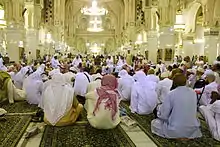Halaqa
A halaqa (Arabic: حلقة - 'circle / ring') in Islamic terminology is a religious gathering or meeting for the study of Islam and the Quran. Generally, there are one or more primary speakers that present the designated topic(s) of the halaqa while others sit around them (in an approximate circle) and listen. The attendees may participate in the discussions, ask questions, and voice concerns. Usually, prayers and supplications are part of such programs. Also, meals or snacks may be served to the participants.[1] Al Halaqa is the Arabic word for gathering in a circle – a round table of sorts (loosely) and there can be many types of rounds. It is also the space in which the public storytellers perform. This traditional space, most commonly called al-halaqa (the circle) is as central to the non-Western performance tradition as the storyteller, and similarly layered with cultural echoes and references. Halaqa performers have included both men and women; a female example was the Moroccan performer Fatema Chebchoub. The Jemaa el-Fnaa Square in Marrakesh, Morocco is a major place of cultural exchange where stories and epic poems are told in Al Halaqas in the center of the square, and is considered one of the nine UNESCO World heritage sites.[2]

See also
- Dars
- Qiyam
References
- "The Islamic Halaqas Program". SF*BASIC. 2004.
- Schmitt, Thomas M. (March 2008). "The UNESCO Concept of Safeguarding Intangible Cultural Heritage: Its Background andMarrakchiRoots". International Journal of Heritage Studies. 14 (2): 95–111. doi:10.1080/13527250701844019. ISSN 1352-7258.